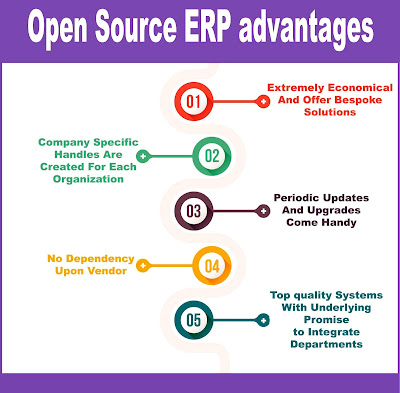Modern day
businesses comprise of several key processes needed to keep the business
enterprise on competitive edge in terms of productivity and efficiency and to
advance towards the achievement of goals. In other words, empowered with
integrated ERP software, one can see through various activities like sales,
sales policy, distribution, franchisees, marketing, customer reviews, customer
service, inventory management, revenue earned, future roadmap, future sale
forecast etc. and with any prolific ERP system in place, such processes and
tasks can easily be charted out, and analysed for quick decision making and
forecasting in the most reliable manner. For any nature of business hailing
from any industry, there are tools available for quick process management which
churn out palatable and actionable result.
Clearly, the
role of an integrated ERP can hardly be ruled out and ignored while talking
about such key business virtues like efficiency and productivity since any
range of processes and sub-processes can easily be translated with precision.
Let us cast a deep peep into the relishing advantages which such accomplished business software (module based ERPs) offer and what core advantages can be drawn out from these:
Modern day
businesses have evolved a great deal and comprise of scores of distinct
processes in a bid to compete with proficiency and in an organized way. As
such, new age ERPs possess superior business modules that are programmed in a
user-friendly manner and smoothen-up the process-flow thereby enhancing the
productivity. Work processes are branched out in a business and with an
integrated ERP in place, such can easily be managed in the most versatile way
and thereby providing you a better management of business activities, resulting
in quick decision making, however diversified such activities may be.
ERP software are based upon prime business modules and users are entitled to select the
module and role and responsibility which he or she has been assigned to and all
of the remaining modules and processes are thus skipped. To popular Tech
experts’ belief ERPs seldom malfunctions or get down frequently, when it has to
manage lesser number of processes. But only the vendors who flourish upon
paramount tech know-how can prevail in such areas to meet such demands and can
go ahead to pacify other business requirements too in other industries.
With any
supreme ERP in place, scalability factor can be rejoiced at length as system’s
capacity rescue businesses from challenges as latter surface in wake of
business proliferation. If a business ERP system is designed by keeping
scalability aspect in sight, such businesses draw a great amount of competitive
advantages and perform brilliantly without suffering any significant degree of
failure or slowdown at any point of business shift.
Certainly, with
ERP business systems which are based upon specific modules, core business
activities however distinct such may be, are blended together in the most
sophisticated way which allows better picture about the businesses as well as
their outcomes. As a relishing outcome, users are empowered to get a clear
picture about the performance, events, development and also about the errors
etched in the workflow and improvement can be initiated right away.
As precisely
crafted ERP software which is being strictly enabled upon modules, all types of
business activities is turned into data and is put on records for each of the
corporate departments (called modules) such as accounts, sales records,
salaries and other costs, revenue sheets according to months, quantities lying
with inventory and warehouse and so forth. Besides, reports are objectively
quantified with quick statistics and necessary calculations done on it, before
being served to department managers as well as to senior management. On such
basis, effortless forecasts are done in an accurate way.
Needless to
say but with such info, which is updated and is obtained/presented in
itemized format, quick decision making becomes a cakewalk which benefits
business corporations even SMBs at length.
With the
influential progress in digital technology, businesses of all dimensions,
approach, sizes and perspectives are undergoing a swift change as there ensues
a typically limited competition among them. As an ideal turn of events, Cloud ERP computing has taken every limited scope business (SMBs) in its own style,
owing to the attributes of affordability and immense simplification. As a
relishing outcome, supreme automation and swift integration of business
processes has taken place in an unprecedented way and which was not common
nearly a decade ago. Earlier, only large enterprises with expansive operations
across multiple locations depended upon express ERPs, but in the present
scenario even the SMBs have leveraged such technology for smooth achievement of
core business objectives.
Such a fact and phenomenal digital-edge factor appears resounding enough but then we need to keep in mind that ERPs differ in terms of utility, operations, business scalability and industry. There are designed, established and implemented scores of ERPs under various brands but then businesses can also enable additional functions as are needed by specific business needs. For instance, companies that are primarily into manufacturing will require ERPs which deal with supply chain and inventory status while the ones in construction or interior designing, will need ERPs which will focus upon staff categories, equipment, sites’ status, construction stages, constructed and delivered units and so forth.
Clearly, with
ERPs in place, companies are empowered to ensure supremely comprehensive
functionality that takes every unique business activity within its realm
but then, unique focus can also be established such as planning for production,
planning for acquiring raw-material, inventory planning, ERP which harps upon
particular industry (like retail sector or finance) or any specific region for
that matter. Nevertheless, there is yet another ERP feature which ignites
passion and excitement among business hearts, i.e. how the ERP implementation
will take place?
While most of
the businesses are seen opting for in-house or on-premises ERP and the whole
software application is installed within the business premises and is run by
tech savvy executives. Such type of implementation is being practised for
a long time and is not cost-effective too.
Alternatively,
one can procure Cloud enabled ERP which is like a service and would run on
cloud space as will be hosted by the vendor and can certainly be more
economical than the former in-house option. Finally, we have a hybrid scenario
and handful of key systems remain in-house with other programs and software
being hosted on cloud.
Clearly, there
exist a host of towering advantages to business enterprises when open source ERPs are explicitly mingled with day to day business processes. Some of the
major advantages are as follows:
Not one will
get surprised from this open source ERPs’ virtue that delight corporations across
the world immensely as they manage to save a huge dollar amount from
implementing such a class of ERPs which are a class in their own. Besides, open source ERPs can easily be custom programmed to suit specific business
objectives ensuring precise handling of unique processes.
When large
corporate giants utilize an open source ERP system, a unique interface shell
comes into action which is specifically meant for that particular organization
and which is formed outside the core system so as to address the unique
business needs and such a system simply blends with the organizational tasks of
daily activities. Contrarily, in case of ordinary commercial systems, their
prevailing interface is re-programmed for sake of customization and this makes
upgrade implementation, a hard task to implement.
Once
customized in the most superior way, initiating timely upgrades to open source ERPs solutions becomes easier, while such are not occasionally possible with
the typical commercial business automation systems. From SMBs to large spread
organizations, such a virtue benefits every organization regardless its
industry and geographical location.
Organizations
completely own the system as well as its sourcing content and there is not felt
any dependency upon vendor and users feel freedom to implement such software
application in their own way.
Not
surprisingly, but with open source ERP(s) in place, top quality business
automation, integrity across processes and performing brilliance is ensured at
every level, since developers simply live their passion up while infusing
programming codes from time to time.
Simply put,
Odoo tops the list when one considers the most promising open source ERP to aid
business process in the digitally holistic way.
The
organization is vibrant enough to program, develop, test and implement,
high-end business applications which are replete with tools and utility
software targeted to specific business needs. They enjoy deep-rooted trust from
millions of companies spanning industries from around the globe, who gain easy
access to the game-changing software which automate their business efforts and
enhance their diligence and productivity manifolds.
They (Odoo Inc) have got around 30 applications patented in their name and which are still
under rapid innovation and upgraded regularly. Then, there is a healthy
community of around 1500 active members who have helped design more than 16
thousand business apps to harness technology for prime business needs.
Odoo ERP has
sought widespread installations as the most superior business software in the
world at present since there are around 3.7 million users from both SMBs to
large business corporations. In the grander scheme of things, they have
developed numerous apps as well, for easy execution of business tasks.
Human aspect
plays a vital role in ensuring successful implementation of ERP business systems since including ERPs in business modules isn’t merely a tech
change. Management mavericks state that that the attitude of working
executives is also crucial to the success of ERPs and drawing its benefits to
the organization’s eventual success. Proper training, staffing and assigning
roles and responsibilities is also significant and such should also be planned
in the most adroit manner.
Not
surprisingly, but when ERP solutions which are module based, can manage the
entire business scenario, management is left with key resources to initiate
quick decision making and to turn the market tide in their favour. For
exploring further about ERP software which are all set out with modules, please
contact us here at hello@art-inc.Co





This comment has been removed by the author.
ReplyDelete